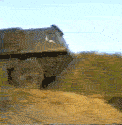|
Yeah, pickles 4 lyfe. I try to keep at least two quarts of fridge pickles on rotation during the growing season (make about a quart a week), extra produce gets turned into hot water canned pickles and goes in the garage.
|
|
|
|

|
| # ? May 28, 2024 23:26 |
|
I asked about pickles in gws, I'm going away for a fortnight and need to quickly sort a bunch of cucamelons with no prior picking experience
|
|
|
|
There are also cuke stirfries and braises. I believe there are even some recipes that use the yellow ones that were allowed to ripen too long.
|
|
|
|
friendbot2000 posted:A word from what I have experienced growing squashes is that bigger != better. The bigger they grow the more the plant focuses on seed production which makes the veggie nigh inedible because of how bitter it is. This might be species specfic though. I havent grown enough varities to apply it across the board. I believe this is just a summer squash thing. I can confirm this does not apply to Waltham butternut squash, as I've had some real whoppers that were sweeter than anything I'd find in a supermarket. I haven't grown any other winter squash since, so far, butternut is the only one I've developed a taste for. kedo posted:None of you are making pickles? What is this world coming to?! I have roughly three gallons of delicious fermented pickles canned and sitting in my basement from the bumper cucumber crop earlier in the summer (before cucumber beetles destroyed my plants). Nice, I love fermented pickles. Do you put any other veggies like onions, carrots, peppers, etc. in there too? I got fuckall for cukes this year and I'm blaming maple syrup season going 2 months later than last year and my laziness for not wanting to deal with seed starting during that time. I bought plants at the local garden center and let them go too pot-bound (apparently) while I figured out where to put them. It was a really sorry plant ever after it had gotten over its initial transplant shock. Big Nubbins fucked around with this message at 16:47 on Aug 16, 2018 |
|
|
|
Shame Boner posted:I believe this is just a summer squash thing. I can confirm this does not apply to Waltham butternut squash, as I've had some real whoppers that were sweeter than anything I'd find in a supermarket. I haven't grown any other winter squash since, so far, butternut is the only one I've developed a taste for. Yeah, I suspect it is a summer squash thing. Butternut squash is sooooo good. I roast those up for snacks!
|
|
|
|
Serious Eats has a pretty good selection of pickle recipes: https://www.seriouseats.com/2012/07/pickling-recipes.html This one is my favorite for fridge pickles: https://www.seriouseats.com/recipes/2017/08/milwaukee-dill-pickles-cucmber-recipe.html
|
|
|
|
mischief posted:I had a wire ring compost setup at the old house but it inevitably just turned into clay. I guess it is going to take more time and effort and ehhhhhhhhhh.... I'm curious about this too. I'm a minimalist composter. I don't own a compost thermometer, pay no attention to carbon/nitrogen ratios, and there's only one rule: Was it alive at one time? If yes, pile it up and come back in six months to a year. Anything not composted at that time gets added to a new heap (with the exception of rocks, which are only there in violation of Rule #1). Occassionaly I'll get a slimy clay-like layer if I didn't take time to layer moldy hay or plant stalks with kitchen scraps or animal manure. If I don`t fluff up and layer this type of material it seems to compact and go anoxic rather than composting properly. Is this what might be happening with your compost? There's actually a second rule, not relevent to most (civilized) people: In early fall, when the bears start coming down from the mountains, seal the compost under a layer of horse manure. Do not add kitchen scraps, fruit, or other attractants to the heap unless they`re immediately sealed under another layer of horse manure. I have no scientific evidence that this works, just 15 years with no more bear-compost problems since we started following this rule, and a YouTube video from an Alaskan composter getting similar results with goat manure. Given how much dogs enjoy ``barn burgers`` ( 
|
|
|
|
I just bag all my leaves in the fall and then keep those next to the compost heap to top whatever kitchen scraps I throw in when the bucket in the kitchen gets full, then wet down the leaves. Three bags of leaves lasts me about half a year, this year I'm gonna try to steal a couple bags from the neighbors when they put them on the curb to throw out. In the desert you also want more sticks, pinecones, and pine needles to fluff the compost, and less airholes so the pile doesn't dessicate too quickly.
|
|
|
|
Shame Boner posted:Nice, I love fermented pickles. Do you put any other veggies like onions, carrots, peppers, etc. in there too? I got fuckall for cukes this year and I'm blaming maple syrup season going 2 months later than last year and my laziness for not wanting to deal with seed starting during that time. I bought plants at the local garden center and let them go too pot-bound (apparently) while I figured out where to put them. It was a really sorry plant ever after it had gotten over its initial transplant shock. I threw some cherry peppers in there since I had a handful, but not enough to merit pickling by themselves. And of course a whole bunch of dried herbs. It's a half sour recipe and they turned out incredibly well all things considered! I'm looking forward to cracking them open, the few I ate fresh right out of the brine were like nothing you can find in stores. Cucurbits are a huge pain in the rear end, though, and I'm not sure whether or not I'll grow them again next year. Between powdery mildew, beetles and their sensitivity to too much/too little water, they require a lot of maintenance. cakesmith handyman posted:I asked about pickles in gws, I'm going away for a fortnight and need to quickly sort a bunch of cucamelons with no prior picking experience Below is roughly the recipe I followed for my half sours. I used plain old cucumbers, but I imagine it'd work fine for cucamelons as well.
This same sort of recipe will work for most veggies you'd like to pickle – the key is having the right percentage brine and fermentation vessels you don't have to burp multiple times per day due to CO2 buildup. kedo fucked around with this message at 21:23 on Aug 16, 2018 |
|
|
|
Quote != edit.
|
|
|
|
You can use cherry tree leaves or horseradish leaves for tannins too.
|
|
|
|
Also note that if you're gonna lacto-ferment your pickles (as per that recipe), make sure you use non-iodated salt. (Default table salt contains iodine which will kill the bacteria you're trying to cultivate. Use pickling salt, sea salt, kosher salt or the pink rock salt that's all the rage now, just not table salt.) Or you can just add vinegar, can them, and have them be sterile and last for years. The USDA puts out some pretty good info on this, including recipes which have been extensively tested to ensure that nobody gets botulism: https://nchfp.uga.edu/publications/usda/GUIDE06_HomeCan_rev0715.pdf It's highly recommended you read that first.
|
|
|
|
That's useful info from the USDA, I can just use the asparagus ratios for what's apparently going to be about a dozen pint jars of garlic chives that decided to grow and start to flower this week after doing nothing all summer. They sure waited longer than last year and I didn't expect them back, but I need to go and cut and package them already before they go to seed. I'll probably just pickle them with garlic in salt and vinegar and then water can them. I'd wash them with this Calcium Hydroxide that I have for something else, but I'm not confident I could adjust the pH back down to sub-4.5pH adequately, consistently, and safely. (That's Lye, great crunch, big botulism risk.) My grape vines are constantly putting out new leaves at the ends right now, so I'll just grab some of the leaves instead. I'm also turning all the cayenne peppers that have decided to ripen at the same time (hooray for that) into vinegar based hot sauce. I have one ripe Caroline Reaper that will be getting mixed into some of it too. I can't wait to discover if I was able to grow it as hot as advertised or if it didn't turn out that way like some of my early Hot Portugal did (they were tasting like sweet peppers while bright red). The habaneros will probably get one of the carrots I grew in their jar of hot sauce as well.
|
|
|
|
kedo posted:Cucurbits are a huge pain in the rear end, though, and I'm not sure whether or not I'll grow them again next year. Between powdery mildew, beetles and their sensitivity to too much/too little water, they require a lot of maintenance. A couple years ago, I'd be inclined to agree. I've always had trouble keeping my squashes irrigated 。・*・just right・*・。 once the summer heat kicks in and rain is infrequent; but One Weird Trick changed my mind: buried wood beds. Last year I had some spare cedar and all these old, mushroomy logs and branches and thought, "what if I dug a trench, piled all this poo poo, then build a raised bed on top?" I won't take credit for this idea; I'd read about hugelkultur online and in a number of my books on regenerative/permanent agriculture (whatever the name is today) and wanted to try a small-scale version. It was just by chance that squashes were the only thing I hadn't planted yet, so they all went into this bed: a hill of 3 cukes (on trellis), a hill of 3 cantaloupe, a hill of 3 Waltham butternut, a crimson sweet watermelon, and a 'cube of butter' summer squash. This was the bed on July 17th last year, zone 6a. I wish I would've taken another photo when it was in full swing.  I don't think the buried wood concept is a magic bullet for water retention, but I kinda see the logs and the fungi that colonize them as water "batteries" for plants that can associate and benefit, while providing nutrients as the wood decomposes. It might be just the buffer you need.
|
|
|
|
Huh, that's a good idea! I've been growing them in full sun in a raised bed filled with compost, but the my soil below the bed is hard packed clay. They were fine for the beginning of the summer, but then we had about a solid month of rain and the raised beds would just fill up with water since the soil below couldn't absorb it quickly enough. That was the beginning of the end for the cukes. Having some extra space to drain beneath the bed couldn't hurt. I also need to be better about getting beetle traps out earlier. My plants were holding their own against powdery mildew thanks to better positioning this year than last (in full sun vs. partial sun), but as soon as the beetles showed up they got destroyed by bacterial wilt in about a week.
|
|
|
|
I made more pickles this week, and they came out a bit weird and I'm trying to figure out why... I got a bunch of pickles from the farmers market, sliced them into spears and canned with a brine made from Ball dill pickle mix. However, unlike the refrigerator pickles I made, or the bread and butter pickles I canned (also using a Ball mix), they have a layer of greenish material on the rim of the jar, as well as a layer of cloudy liquid on top of the liquid. Here's one (note: I made these less than 2 days ago. also that's not a crack in the photo, it's just a loving cat hair, ugh)  I'm almost certain this isn't any sport of spoilage because (a) I noticed it right after they had cooled, (b) the jars all have good seals and (c) I definitely processed them long enough (I gave them a few minutes longer, actually, because I'm still bad at judging when my canning pot goes from a light boil to a full boil, for some reason.) Could this just be material from a few of the pickle spears that got smashed a little as I tried to wedge more into the jars (partially to fill space, but also to keep the rest from floating once they were processed), or should I be concerned? Slanderer fucked around with this message at 00:49 on Aug 20, 2018 |
|
|
|
I'm not familiar with the Ball mix you're using, but assuming you're attempting to ferment the pickles and not just doing a quick pickle the green stuff is mostly likely some mold. Just wipe it away, it won't hurt anything. If the cloudy liquid is kind of a white film on top of the brine, it's probably kahm yeast. It's harmless but can alter the flavor of your pickles, so just skim it off. If the cloudiness extends down into your brine, (again, assuming fermentation) it's the bacteria doing its work. Fermented pickle brine is supposed to be cloudy, and depending on the type of stuff you put in the jar you'll see different colonies form, grow and then eventually collapse as they use up the nutrients they're consuming. For example, if you put crushed garlic in your brine you'll get weird cotton candy/shard-like colonies after only a few days, but they only stick around briefly before disappearing and being replaced by something else. e: It never hurts to get some pH test strips and make sure it's acidic enough. If you're in the safe zone, the chances of something growing in your brine that'll make you sick are miniscule. e2: oh, totally missed the part about this happening right after cooling. I have no idea in that case, but if you processed them correctly I kinda doubt whatever it is is dangerous. kedo fucked around with this message at 04:50 on Aug 20, 2018 |
|
|
|
Does that mix contain powdered dill? Because it looks like residue from boiling things that leave residue. Could have happened during the jarring process while boiling. The scummy part could be the salts in the mix not dissolving well, or again just leaving a residue. Just follow normal safety precautions and if it smells off, it is off. Pro-tip about testing your pH. Strips are okay, but they do have a shelf life (3 years or so), so be sure to make sure they're within date as they can start to throw errors after that.
|
|
|
|
kedo posted:I'm not familiar with the Ball mix you're using, but assuming you're attempting to ferment the pickles and not just doing a quick pickle the green stuff is mostly likely some mold. Just wipe it away, it won't hurt anything. If the cloudy liquid is kind of a white film on top of the brine, it's probably kahm yeast. It's harmless but can alter the flavor of your pickles, so just skim it off. Even though this doesn't apply to my pickles (as you figured out), thanks anyway--I'll keep it in mind when I'm checking on the pepper mash I started fermenting a few days ago. Jhet posted:Does that mix contain powdered dill? Because it looks like residue from boiling things that leave residue. Could have happened during the jarring process while boiling. The scummy part could be the salts in the mix not dissolving well, or again just leaving a residue. Just follow normal safety precautions and if it smells off, it is off. From their website: Ingredients: Salt, Dehydrated Garlic, Calcium Chloride, Dextrose, Maltodextrin, Dill Seed, Less Than 2% Of Spices, Natural Flavors And Color, Silicon Dioxide I think you're right, though--I was just surprised since I have seen it in any photos before. I'll shake the pickles, store them upside for a while, or something else to see if it dissolves (especially if it's just a cosmetic issue). Thanks!
|
|
|
|
Once in a while I think about maybe getting into pickling, then I read about it and remember how much trouble we're currently having simply remembering / being able to water our plants. Some day though!
|
|
|
|
Sir Lemming posted:Once in a while I think about maybe getting into pickling, then I read about it and remember how much trouble we're currently having simply remembering / being able to water our plants. Some day though! Fermenting is the only hard kind of pickling. Otherwise it's just "add stuff to jar, stick in hot water bath/pressure cooker/fridge."
|
|
|
|
Vinegar Water Sugar Dill Cucumbers Refrigerator DFamous.
|
|
|
|
Duck and Cover posted:Vinegar You forgot garlic and red pepper flakes. And some mustard seed.
|
|
|
|
Crakkerjakk posted:Fermenting is the only hard kind of pickling. Otherwise it's just "add stuff to jar, stick in hot water bath/pressure cooker/fridge." Yeah this, and there are tons of recipes around (e.g. the USDA ones I linked). The point of pickling is that as long as you heat treat things and provide enough acidity, they'll last more or less indefinitely. It's actually pretty accessible even to people who forget to water their plants.
|
|
|
|
i finally opened up my first pickles today (I hosed up the canning process since it was my very first attempt, but I realized it immediately and turned them into refrigerator pickles). used a recipe from Serious Eats and they are good as Hell
|
|
|
|
Crakkerjakk posted:You forgot garlic and red pepper flakes. And some mustard seed. No I didn't.
|
|
|
|
Baker Creek is running free shipping until this Wednesday, code is "FALL" at checkout. I just got my order in from them, going to give fall and early winter gardening another shot now that I've got time in the day to keep up with it. I've tried a few times and failed hilariously every single time. Go get some weird seeds, post some pictures, plant some stuff!
|
|
|
|
Crakkerjakk posted:Fermenting is the only hard kind of pickling. Otherwise it's just "add stuff to jar, stick in hot water bath/pressure cooker/fridge." I made fermented pickles this year and it was actually way easier than canning. I'd given up on canning pickles years ago because my kids always ate them within 3 days of me sealing the jars anyway, swapped to fridge pickles for a while but went fermented this year. Making fermented pickles was just "add stuff to jar, let sit on counter for 3 days", it was the same amount of prep/stove time as the fridge pickles but with the added bonus of probiotics!
|
|
|
|
I'm pickling my current haul of cucumbers and carrots this week. The worst part about it is washing all the large equipment and finding enough room on my counter for everything. Today I turned my hot peppers into hot sauce. Super easy too, up until the point where the mild batch has decided to try to push out the top while on it's pasteurization bath. Should have let it settle more to get the air out after blending maybe? And/or filled less and left the tops cracked open. Either way, that's a dozen cayenne and a carolina reaper in the three bottles that have not had an issue. I should hopefully have another batch to make in a month or so. It's tasty, but not really as hot as I was expecting. Perhaps it was because it was the first reaper off the plant. It tastes really awesome and I'm very happy to have planted those varieties this year. I'll definitely be doing 4 cayenne plants again next year, and probably the reapers again too. There are a lot of flowers that are closing and turning to fruit on all three of my hot and super hot varieties, so as I was expecting them to not produce they're going for another round and that's awesome. Also, if you for some reason need a metric tonne of cherry tomatoes, find yourself some Riesenstaub tomato seeds. I've pulled in about 14 dozen of these things and there are another 4-6 dozen green fruit on all of three plants.
|
|
|
|
mischief posted:Baker Creek is running free shipping until this Wednesday, code is "FALL" at checkout. I just got my order in from them, going to give fall and early winter gardening another shot now that I've got time in the day to keep up with it. I've tried a few times and failed hilariously every single time. Go get some weird seeds, post some pictures, plant some stuff! Goddammit I need to do this already. I get so burnt out at the end of every summer because it's so brutal outside, and it's hard for me to muster the enthusiasm to get a whole new garden going.
|
|
|
|
My stuff is coming in! The big garden gem is turning red. If I can snag this one and get a good bite out of it, I'll consider my hobo piss tomato experiment a success.  The garden treasures are also fruiting now too. I almost gave up hope because they were flowering for a whole bunch of weeks without any fruit setting and now there's like 7!  Also I'm extra hopeful for this plant because it's the only one that didn't get lovely when I overwatered them all. Check out my juicy melons   I have two growing right now about the size of jawbreakers. They're growing extremely fast! This is them after like 2 weeks of pollination and this is after like 70 days of absolutely nothing. I had to prune two other fruits, which were smaller and also dying. Unfortunately, the second one has black spots all over it and it's not growing as fast as the other one.  The internet says these are rub marks, and it seems to match up with what I'm seeing. It was close to another vine and some leaf that has markings that match up to the smaller black spots on it. The wind was making them rub together. I moved the vine to be supported by one of the hooks hanging off my bucket. In my excitement I also decided to work on some watermelon hammocks. I probably won't need them for another week at least, but it's better to do this now rather than later.   I made the hammocks out of some leftover burlap and nylon string. I'm concerned that this might not hold for the rest of the season but it's working surprisingly well on my test "surrogate".
|
|
|
|
I am trying to make a all year herb garden and I am a little worried that the place I plan to winterize them doesn't get enough sun. They thrive on my apartment porch which yets 6-7 hours of full sun. However one of the porch pillars blocks the view of the sun where I plan to put it once the temperatures drop. It gets natural light nearly all day and definitely gets 3 hours of full sun in the morning...I just am not sure how concentrated the sunlight is for the rest of the day. This may be a dumb question, but how can I figure out how much full sun a particular location gets? Edit: If any of you goons cook, I can't recommend growing and drying your own herbs enough. It has saved me so much money and eliminated a ton of waste!
|
|
|
|
friendbot2000 posted:This may be a dumb question, but how can I figure out how much full sun a particular location gets? I'm assuming that there's a reason you can't just observe the location and figure out what times the sun is occluded. That's one reason why I recommend making careful observations at least month-by-month and keep notes throughout the year on when key spots are in/out of sun and for how long; what direction the prevailing wind blows; and maybe even how water is shed or stored, where, and for how long for normal and abnormal rain events. If you're trying to determine sunlight for a spot at some point in the future, I'd recommend using software to do the hard work of figuring that stuff out. I use Sun Seeker (iOS/Android) because it has a nifty AR overlay that shows where the sun is at any given date or time. I always have to recalibrate the compass for the AR view, but once that's done, it's a great tool for getting a rough estimate of sun exposure.
|
|
|
|
Has anyone grown/harvested Horseradish? I've got a massive plant in a ~18" container and I'm looking for tips on when/how to harvest it and what to do with the root. I understand it involves grating/microplaning the root and then storing it with vinegar, but any additional advice would be great.
|
|
|
|
Hubis posted:Has anyone grown/harvested Horseradish? I've got a massive plant in a ~18" container and I'm looking for tips on when/how to harvest it and what to do with the root. I understand it involves grating/microplaning the root and then storing it with vinegar, but any additional advice would be great. I leave my horseradish in the pot and harvest as I need it (which isn't terribly often, arguably). Any root pieces left behind will sprout into new plants. Roots get peeled and grated, add a little water to this and then add the vinegar once the root tastes hot to your liking- breaking the root cells releases the compound that makes the heat, vinegar stops the reaction. Theoretically you can store horseradish like this but it loses a lot of its bite over time which is why I only pick it when I need it. e: I forgot to mention, I highly recommend grating horseradish outside. You'll know why once you do it.
|
|
|
|
friendbot2000 posted:I am trying to make a all year herb garden and I am a little worried that the place I plan to winterize them doesn't get enough sun. They thrive on my apartment porch which yets 6-7 hours of full sun. However one of the porch pillars blocks the view of the sun where I plan to put it once the temperatures drop. It gets natural light nearly all day and definitely gets 3 hours of full sun in the morning...I just am not sure how concentrated the sunlight is for the rest of the day. A lux (cheapish) or a par meter (not cheap). You could just try growing what you want and if you see signs of light deficiency buy a grow light. Duck and Cover fucked around with this message at 17:42 on Aug 21, 2018 |
|
|
|
Btw the treatment for overwatering is drainage, not drought stress. Water them tomatoes or they’re gonna start dropping leaves and fruit. By the time they’re flopping like that they’re already losing root hairs.
|
|
|
|
Yeah a single instance of overwatering isn't going to hurt anything. It's constant saturation, either from lack of drainage or too-frequent irrigation, that causes problems.
|
|
|
|
Gotta say I'm surprised, looks like you pulled it off in the end. Hope the tomatoes are tasty.
|
|
|
|

|
| # ? May 28, 2024 23:26 |
|
^^ thanks! About the overwatering, that's sooo true. What happened was one week last month it was extremely warm and my plants started wilting so I freaked out and put like a gallon of water into each bucket. They stayed waterlogged for weeks after that and only a couple weeks ago did the plants start drying out. I think they're stable now. I was considering taking a drill and putting more drainage holes in them but that would mean trying to drill them while hanging off the bridge. Since the tomato plants are coming out of the bottom I don't really have anywhere to put them to perform maintenance on the buckets. I'm hoping to either improve my olla irrigation setup so I don't need to worry about draining or build, like, a portable shepherds hook so I can work on them more easily.
|
|
|





























